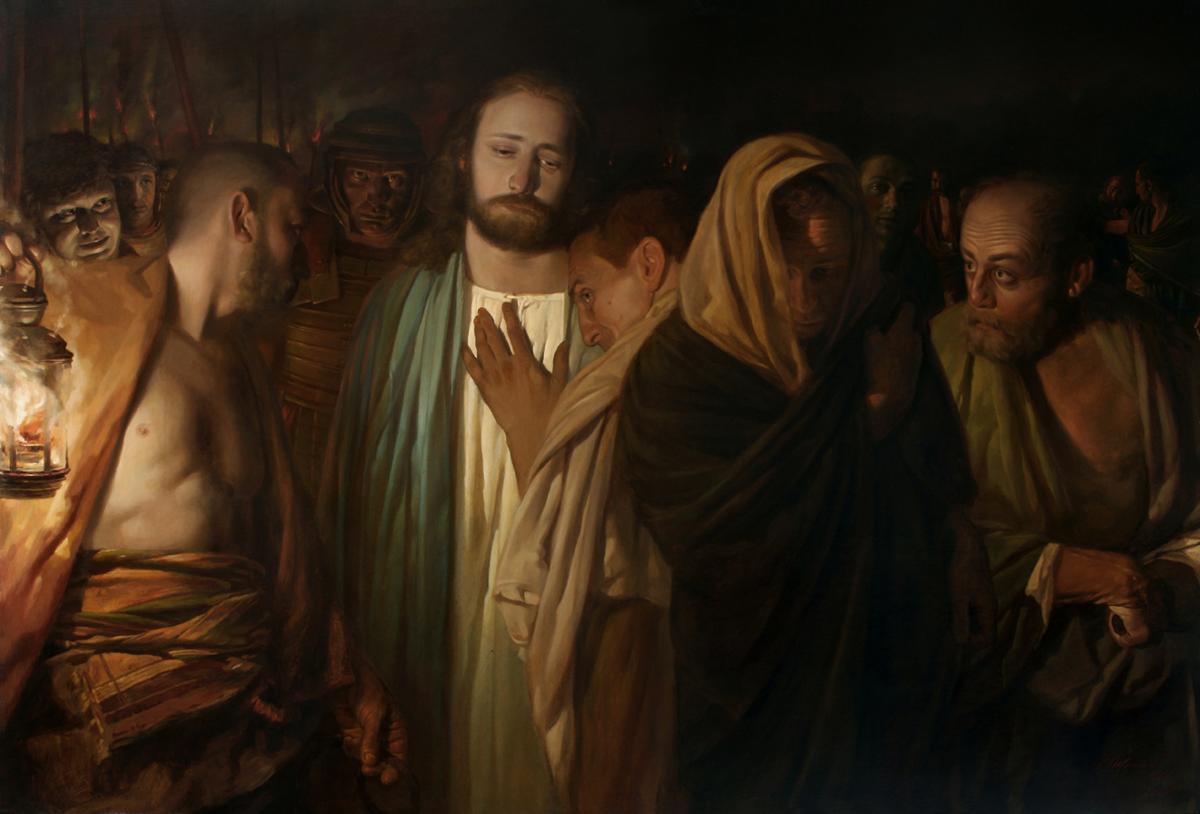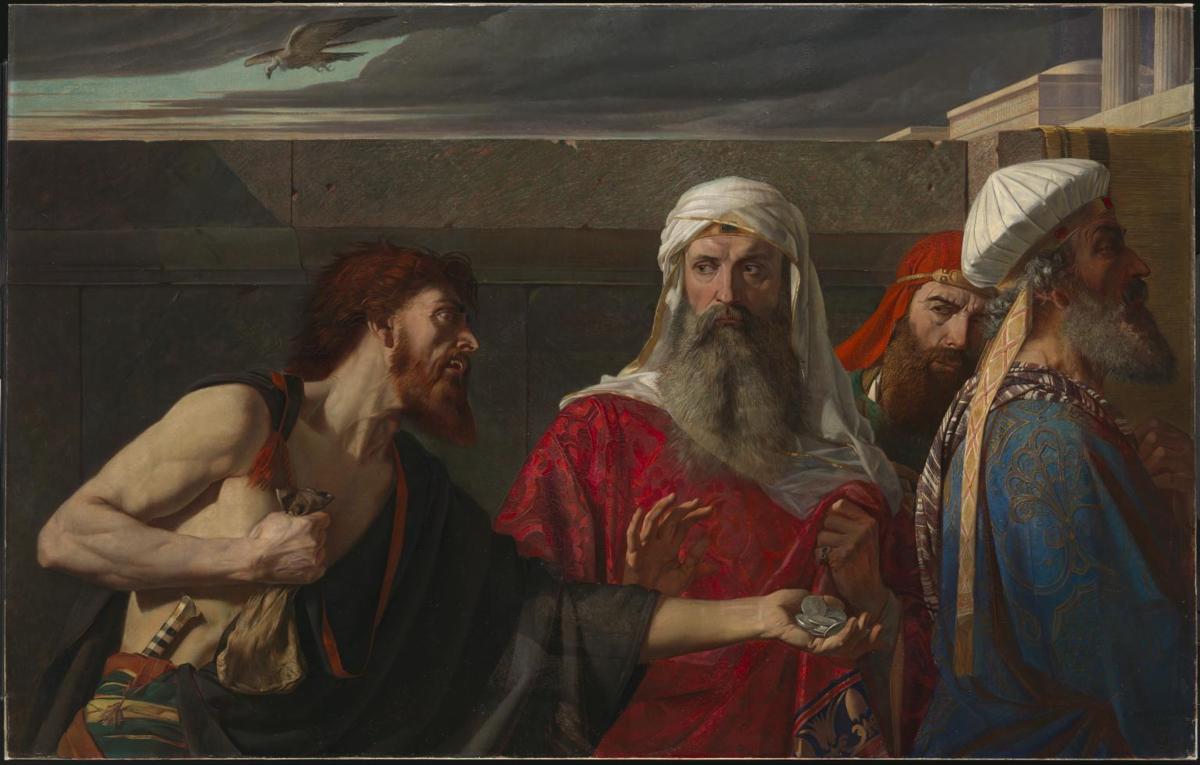March 23: Beyond Our Own Making
♫ Music:
Monday, March 23
Scripture: Matthew 27:3-7
Then when Judas, his betrayer, saw that Jesus was condemned, he changed his mind and brought back the thirty pieces of silver to the chief priests and the elders, saying, “I have sinned by betraying innocent blood.” They said, “What is that to us? See to it yourself.” And throwing down the pieces of silver into the temple, he departed, and he went and hanged himself. But the chief priests, taking the pieces of silver, said, “It is not lawful to put them into the treasury, since it is blood money.” So they took counsel and bought with them the potter's field as a burial place for strangers.
BEYOND OUR OWN MAKING
I think the story of Judas scares many of us.
It brings up such hard questions—why did Judas betray Christ? Why does God’s plan for redemption include this horrific betrayal? Why didn’t Judas, in his remorse, return to Jesus?
There’s much we don’t know about Judas Iscariot. Interpreters even argue about the meaning of his name. We don’t know why he handed Jesus over, but some suggest it was because Jesus was not who Judas wanted him to be. Judas, probably a Zealot, would have been hoping for a military messiah to rise up against the Roman colonizing forces.
A colonizing force seems like such an obvious evil to overthrow: Judas’ desire is such a human desire. As infamous as Judas may be, we can see ourselves in his potential confusion and anger—Jesus was not saving the way he should be saving, not lording the way he should be lording.
And yet, Judas realized his mistake. Edward Armitage’s Remorse of Judas sears with the agony of such a realization—sears our own hearts with an agony. For what times have we—in our arrogance, our clinging to shame—missed God as well?
Though we are centuries removed, Judas’ despair unsettles and scares us. The shadow of his heinous decision strikes our hearts with coldness. But why? He betrayed Christ—he is cursed with his sad death! . . . But there is still that unsettling, that ache around the edges of this passage.
I think it is because we recognize this danger of being so lost in ourselves that we lose Jesus. We live life, or portions of it, in drawn-out treachery; choosing again and again some god who does not love unconditionally, who only offers ease and happiness, who has little hope for us. We miss Christ, and something great breaks when this happens.
The sadness in the face of Jesus in Andrey Mironov’s The Treachery of Judas alludes to this. The way Judas leans against Christ, with affection, protection, hypocrisy and ill-intent—all these attitudes mixed together, all under that haunting face of Christ—compels us to question our own hearts’ entourage of worship and treachery.
Some of the ‘yes’ to following God operates because we want God to act in certain ways, to be a certain God. We massage and manipulate the image of God made in our own desires, using a program of ‘faith’ to camouflage the hunger for control. What room remains in the heart for the God beyond our making?
Like John, Thomas and Peter sing in Rob Gardner’s “Is It I, Lord?” we too can ask, Is it I who betrays you? Do we really know, as we look into the mirror or gaze at our hands in prayer, that nowhere in us is the propensity to deny God the reality of who he is?
But grace is at work. Grace can help us dismantle our own designs of the Grace-giver.
And the result is not just ruin to our little kingdoms—no, it is much greater: we come to know even more fully, even more deeply, the wondrous Presence of our Savior and King.
Lent offers the painful yet exquisite time to peer into our own god-designs. We can ask God to start dismantling our self-centered expectations of Him, so that we can experience his beautifying redemption evermore fully. Here we can remember that we are, like Judas, but dust, in need of a Savior beyond our own making.
PRAYER
O Savior and Lord,
I don’t want to betray you,
because I believed somehow
you’ve betrayed me.
I want to trust you
more than my designs of you.
Inspect my heart—
show me how I am
willfully and unwittingly
missing you.
Search me, O God, and know my heart;
Try me and know my thoughts.
See if there be any grievous way in me,
and lead me in the way everlasting.
Lead me, Lord, unto you. Amen.
Jessica Brown, Graduate Student, Institute of Spiritual Formation
The Treachery of Judas
Andrey Mironov
2009
Oil on Canvas
&
Remorse of Judas
Edward Armitage
1866
Tate Museum, London
Oil on canvas
About the Artist & Art (Piece 1)
Christian artist Andrey Mironov’s oil paintings of Biblical scenes are reminiscent of Caravaggio with their dramatic lighting and detailed portraits. The Treachery of Judas depicts Jesus’ arrest, as his disciples try to defend him from Roman soldiers.
About the Artist & Art (Piece 2)
Edward Armitage (1817 – 1896) was an English painter who studied at the École des Beaux-Arts in Paris. He did frescoes for the Houses of Parliament, various churches and other public buildings in England. He first exhibited at the Royal Academy in 1848, and became a member of the Academy in 1872. Most of his paintings focused on classical or biblical scenes.
About the Music
Lord, Is It I? lyrics
Narrator:
On Thursday, the first day of the feast of unleavened bread, the disciples came to Jesus, saying unto him, “Where wilt thou that we prepare for thee to eat the Passover?” And he said, “Go into the city to a certain man, and say unto him, The Master Saith, My time is at hand; I will keep the Passover at thy house with my disciples.” And the disciples did as Jesus had appointed them; and they made ready the Passover.
Narrator:
Now when even was come, Jesus sat down with the twelve. And as they did eat, he said, “Verily I say unto you, that one of you shall betray me.” And they began to be sorrowful, and to say unto him one by one, “Is it I?”
Choir (in Aramaic):
Dkhad menkuhn meshlem
(One of you shall betray me.)
John:
Lord, is it I?
Would ever I betray Thee?
Having known Thy love, could I so cruelly turn away?
Could my heart so fail Thee and my feeling turn so cold?
If I should leave Thee, where would I go?
Thomas:
Lord, is it I?
Am I then to betray Thee?
Having seen Thy wonders, could my foolish heart be swayed?
Is my faith so little that my soul would cease to burn?
If I should wander, where would I turn?
John:
If I am prone to leave Thee,
Thomas:
If I am wont to doubt,
John & Thomas:
Oh, wilt Thou still receive me,
John:
Bind me fast!
Thomas:
Oh, find me out!
John:
That I may never wander,
Thomas:
That I may ever see,
John & Thomas:
Oh, that my hope seek not but Thee!
Thomas:
That I might follow with Thee!
Peter:
Lord, is it I?
Could ever I betray Thee?
Having followed with Thee, could I seek some other way?
Though my heart is willing, could my flesh become so weak?
If I should leave Thee, whom would I seek?
John:
O Savior, Take Thou my weakness from me!
Thomas:
Help Thou my unbelief!
Peter & John:
Let nothing overcome me!
Thomas:
Be Thou with me!
Peter:
My sure relief!
Thomas:
Thou art my only Shepherd.
John:
Thou art the only Way.
Peter:
Oh, may I ever serve Thee...
For it is I who owe Thee my devotion.
It is I, yes I, so safely folded in Thy care.
Let mountains fall!
Thomas:
Let earth divide!
John:
Let valleys rise!
John, Thomas & Peter:
Yet one thing shall I know…
Peter:
I will not leave Thee...
If I should leave Thee, where would I go?
Judas:
Master, is it I?
Chior (In Aramaic):
Dkhad meshlem li...
(One shall betray me.)
Narrator:
Jesus said unto Him, “Thou hast said. That thou doest, do quickly.” Judas then went immediately out: and it was night.
About the Composer & Performers
Rob Gardner is a contemporary composer. He has been playing instruments and singing since he was young, but began writing music while in college. He writes both sacred and secular music, including film scores and musicals. Gardner is the president of Spire Music, a nonprofit organization whose mission is “to encourage the composition of new works by creating opportunities for their performance.”
The London Symphony Orchestra, founded in 1904, is London’s oldest symphony orchestra. They have been recording albums since 1912, including more than 200 film soundtracks.

